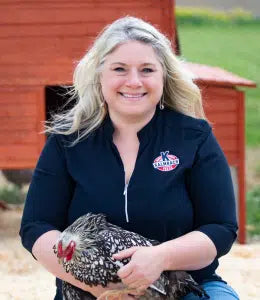Ducks are a wonderful addition to any flock! While raising ducks is very similar to raising chickens, there are some pretty distinct differences in how ducks function and eat. So, that begs the questions, “Can ducks eat the same treats and snacks as chickens?” Absolutely! However, ducks typically have different favorites when compared to chickens.
The Duck’s Bill
The most distinguishing feature of a duck is their bill. The beak of a chicken is pointed and allows chickens to peck and pull at their food sources. Ducks use a much gentler approach with their rounded bills. Because the anatomy of a duck is different, and because ducks are waterfowl, they often prefer vegetation as their primary food source. Ducks are omnivores, so they will eat insects and other animals found around bodies of water. However, the majority of their foraging is plant material.
A Duck’s Favorite Treat
Because of their love for vegetation, a duck’s favorite treat is often yummy greens. Ducks love lettuces, kale, collards, and any other leafy vegetable. Not only are these greens
great nutrition, they can also mimic natural foraging behavior. You can feed these greens as whole leaves or chopped. If you are giving large pieces, it is always a good idea to make sure the ducks have access to grit, either through natural foraging or provided separately, to help your ducks digest the larger material. Ducks also love fruits and vegetables. Fruits are probably my ducks’ 2nd favorite treat. Berries are gobbled up as soon as I put them down! I find that my chickens can easily peck at the flesh of fruits like apples and pears, so I give those whole to the chickens. However, for ducks, you may want to chop or simply smash the fruit to open the flesh. A duck’s rounded beak makes it harder to break through the flesh of fruits with skins, so it is easier if you can start the process for them. Melons are also wonderful treats for ducks. Since the melon rind is hard and usually pretty thick, I always cut melons in half or smash the melons open before giving them to my ducks. You can always tell when a duck has been eating a melon, because there are smooth “scoops” where the duck’s bill ran across the flesh. Large melons, like watermelon, will also provide extended entertainment as the ducks work to eat every last bit of the flesh!
Ducks can eat nearly any vegetable that a human can eat. They will happily consume green beans, broccoli, cabbage, cauliflower, peas, carrots, corn, etc. I absolutely adore watching my ducks work through the leftover pieces after my family has corn-on-the-cob! They are so funny pushing the corn pieces around with their bills. I prefer to give ducks larger pieces that they have to eat slowly (i.e., corn left on the cob, a whole cabbage, etc.), so that they don’t eat too quickly. And, it gives them some quality and nutritious entertainment. As mentioned earlier, ducks are omnivores and waterfowl, so they do love insects, fish, and other aquatic animals. Mealworms, grasshoppers, and crickets are very common treats that you can buy for your birds, and
ducks love them! Just be careful to limit the amount of these treats because they are very high in protein. Too much protein, especially in young ducks, can lead to growth problems, very large eggs, and even angel wing. Scratch grains are also a very common treat and a great energy source for ducks. Just be aware that scratch grains are carbohydrate dense, but they don’t have a lot of the other nutrients (amino acids, vitamins, minerals, etc.) critical for growth and health in ducks.
Ducks love scratch grains and they are a great way to bond with your flock. However, it’s essential that you don’t overfeed scratch grains. Remember, we need to limit our treats to no more than 10-15% of total feed intake. The vast majority of their nutrition should be coming from the balanced complete feed. Feeding “extras” to your birds is a wonderful way to bond with your flock. I really enjoy heading out to the coop with treats and seeing how excited the birds are for me to toss out my treasures. I want my birds to enjoy their treats. I want my birds to be good bio-recyclers. But, most of all, I want my birds to be healthy! If I wouldn’t (or shouldn’t!) eat it myself, I usually avoid giving it to my flock. Stay tuned!

